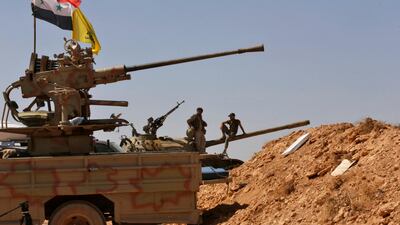Pressure is mounting on the Trump administration to craft a strategy to counter Iran in Syria, with a new report by former US generals and diplomats calling for an urgent push against Iranian proxies in the war-torn country.
The report Countering Iranian Expansion in Syria, issued this week by the Iran Task Force at the Jewish Institute for National Security of America, was co-authored by six former generals including James Conway, former commandant of the US Marine Corps, and a group of bipartisan former diplomats and state department officials.
Defining the Iranian expansion in Syria as the “most urgent” priority for the Trump administration in its strategy to counter Tehran regionally, the report calls for the United States to “impose real obstacles to Tehran’s pursuit of total victory by the Assad regime in Syria".
“Time is of the essence, as Iranian-backed forces recently have retaken nearly all the country” with the exception of “lands liberated from Islamic State [ISIL] by the US-led coalition,” it adds.
If these gains are not reversed, they “threaten to entrench Tehran as the arbiter of post-war Syria and consolidate its control of a 'land bridge' connecting Iran directly to Lebanon and Hizbollah”.
The 16-page report, first made public by The Washington Post, calls for "a coherent US strategy and force presence that looks beyond the impending downfall of ISIL to deny Iran's destabilising objectives in Syria and restore leverage against Tehran".
It also lists Iran’s vulnerabilities in Syria, including being “dependent on Russian air power” and being stretched thin on the battlefront to compensate for Assad's fatigued forces.
The report warns that a “complete Assad victory facilitated by Russia and Iran would further undermine the credibility of US commitments to the region and consolidate Tehran’s position as the predominant power in the strategic crossroads of the Middle East.”
The regional ramifications of Iran’s rising influence are becoming more evident, ranging from Saad Hariri's resignation as Lebanon's prime minister to "Yemen, where Iranian-supported Houthis launched their most brazen missile attack on Saudi Arabia to date”.
In advocating a new US strategy that would protect key allies, "especially Israel and Jordan”, the report calls on the White House to “adopt a clear declaratory policy" for Syria to "prevent both the re-emergence of [ISIL] and Assad recapturing the entire country”, including that the US and “its allies and its Syrian surrogates will vigorously defend themselves if attacked.”
The report faults the Obama administration's hands-off policy in Syria for creating a vacuum exploited by Iran, Russia and Turkey, saying: “All three developed or expanded military footprints in Syria in the wake of the unfulfilled 2013 US redline and the JCPOA [Iranian nuclear deal]."
It also calls for assistance to Syrian surrogates in holding strategic territory liberated from ISIL.
The report follows a US national security delegation's visit last week to Israel, which also has concerns about Iran's presence in Syria, and a letter by 43 members of congress to secretary of state Rex Tillerson calling for a strategy to prevent Iran from gaining a permanent foothold in Syria.
Meanwhile, the US treasury department on Monday sanctioned several individuals and companies, including one based in Germany, over an operation to print counterfeit Yemeni currency "potentially worth hundreds of millions of dollars" for the Quds Force, the foreign operations wing of Iran's Revolutionary Guard Corps.
“This scheme exposes the deep levels of deception the IRGC-Quds Force is willing to employ against companies in Europe, governments in the Gulf, and the rest of the world to support its destabilising activities," the department said.
_______________
Read more:
After one year, Trump’s Middle East policy remains tough on rhetoric but short on action
43 members of US congress urge Tillerson to counter Iran in Syria
US delegation in Israel to soothe concerns over Syria ceasefire deal
_________________


